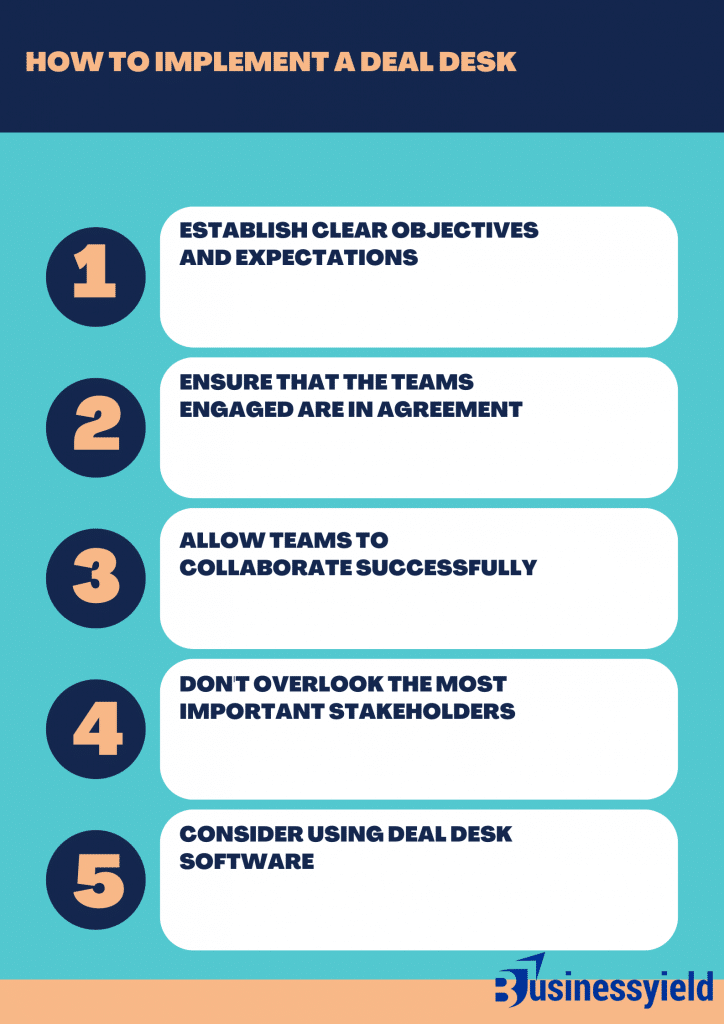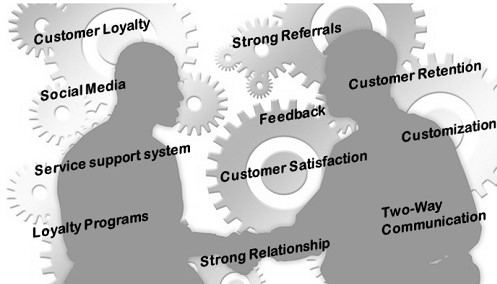Does your sales process feel like a mess with deals constantly slipping through the cracks? If so, you’re not alone. Through my research, I found a shocking 72% of companies struggle with disorganized sales pipelines that lead to missed revenue opportunities. However, I also uncovered a potential solution that helps businesses get their sales process under control – implementing something called a “deal desk” system.
The data shows companies using a deal desk gain full visibility into where every single deal stands. They can quickly identify the hottest leads, catch stuck deals before they stall out, and prevent promising opportunities from falling through entirely. On average, from my research, having a streamlined deal desk system in place accelerated sales cycles by 27%.
But what exactly is this “deal desk” thing? This guide will break it down in simple terms based on my extensive research and analysis. You’ll learn what a deal desk does, how it systematically manages deals from start to finish, and the key benefits it provides for maximizing sales and growth.
Key Points
- The goal is to increase revenue by ensuring that high-value deals move quickly through the sales funnel
- Prioritize the customer throughout the sales cycle because a poor customer experience can result in lost momentum, disengagement, and a negative initial impression of the company and the teams with which they have engaged.
- To avoid unfavourable effects, preferably frequently, conduct a deal desk study whenever you assess your sales process.
What is a Deal Desk
A deal desk is a cross-functional team dedicated to ensuring that high-value, complex deals in the pipeline are completed and signed. It consolidates all key stakeholders and information in one location and frequently comprises representatives from the sales team, finance, legal, product, marketing, customer success, and support. The structure may differ from organization to organization. Deal desks boost sales efficiency and minimize bottlenecks in the deal process by negotiating specific pricing and managing contracts.
What exactly does a deal desk do?
Deal desks can help a fast-growing organization reach its aggressive growth targets without sacrificing customer experience, service quality, or regulatory difficulties.
Deal desks also standardize the process; by generating contract templates, approval procedures, FAQs, and so on. Basically, commercial teams can shorten the sales cycle and close agreements more efficiently, with no team acting as a bottleneck.
Who Runs the Deal Desk?
Many will need to learn that revenue operations teams are often assigned to administer a deal desk. Sometimes, the revenue operations manager consolidates information from several teams. In larger firms, a deal desk manager or expert advises the sales staff and assists salespeople in closing more deals.
How a Deal Desk Works
A deal desk, or concentrated staff, facilitates exclusive, high-end transactions. It oftentimes works with complex issues using a cross-functional team to generate solutions that are a little unusual for standard sales channels. The goal is to increase revenue by ensuring that high-value deals move quickly through the sales funnel.
Deal desks are important for firms because they allow them to handle unexpected transaction requests. They also influence sales-related responsibilities, such as pricing and contracts, that aid the overall deal process. However, a deal desk handles only some sales transactions. Deal desk resources should be kept for high-value, tough situations by allowing regular deals to proceed through the standard sales process.
Responsibilities of a Deal Desk in Sales Operations
Deal desks demand great power and authority to make commercial judgments. They must have the expertise, power, and authority to navigate red tape and make sound pricing and contract negotiating judgments.
#1. They are in charge of Deal management
Deal desks are responsible for overseeing the full deal process in complex transactions. Anything outside the boundaries granted to the sales organization for pricing and contract authority is described as a “complex deals.”
#2. They Help in Deal Approval
As I earlier mentioned, the concept of a deal desk is an approval process required in various sales cycles in enterprises. Deal desks review and approve every deal that enters your firm. This plays a critical role in general sales operations.
#3. They Define Common Parameters
The sales organization can use the “standard deal” parameters, and tools deal desks provide and manage. This is also a fundamental requirement since, without properly defined parameters, how can sales activities be carried out effectively?
#4. Managing Internal Problems
Internal problems that need to be successfully managed tend to mount and, as a result, have a detrimental impact on overall sales operations. transaction desks are the sales organization’s principal point of contact for transaction negotiations and internal dispute resolution.
#5. Help in Getting Answers
To be in this position, you must be creative and goal-driven. Deal desks are given the authority to develop non-standard deal solutions while maintaining your company’s brand consistency.
How to Implement a Deal Desk

If you’re considering setting up a deal desk, here are some pointers to get you started
#1. Establish Clear Objectives and Expectations
Before anything else, it’s essential to determine what the deal desk will do. Defining the duties of other colleagues is also crucial. Having these objectives, key results, and defined roles in place helps guarantee that all teams participating are on the same page.
#2. Ensure that the Teams Engaged are in Agreement
To ensure the transaction desk runs smoothly, stakeholders and their supply resources must be aligned. This ensures a consistent, seamless flow of information, allowing sales to conclude agreements without raising questions. In the legal case, this may entail presenting a page providing answers to frequently asked issues, eliminating the need for sales to call legal every time a contract is negotiated.
#3. Allow Teams to Collaborate Successfully
The deal desk needs authority and accountability to make decisions without involving others, ensuring they are empowered. Legal teams can allow sales to make decisions based on non-standard contract terms, or they might create an approval system that requires legal review whenever a contract deviates from preset parameters.
#4. Don’t Overlook the Most Important Stakeholders
The deal desk is meant to help sales conclude deals more quickly, but not at the price of the customer experience. Make sure to prioritize the customer throughout the sales cycle because a poor customer experience can result in lost momentum, disengagement, and a negative initial impression of the company and the teams with which they have engaged. Regardless of how efficient the deal desk is, if the client or customer had a poor experience, sales will not receive signings on the dotted lines.
#5. Consider Using Deal Desk Software
Deal desk software, often sales automation software, can help teams handle and maintain their deals more efficiently. Integrating this software with sales’ preferred CRM can also result in a two-way data flow, keeping everything up to date and assisting teams with version control.
Checklist for Deal Desk.pdf
How to Set Up a Successful Deal Desk
Like anything else in your firm, your deal desk’s effectiveness as a successful asset is determined by how it is structured and organized.
Consider these best practices to establish a successful deal desk—and avoid some of the typical reasons why deal desks fail:
#1. Identify the Duties of all Deal Desk Personnel and Stakeholders
Each deal desk is unique, and its setup and structure may differ between firms. Identifying the duties and responsibilities of all deal desk personnel and the expectations of each stakeholder who will collaborate with the deal desk team is critical.
I had a friend who started setting up a deal desk; after he had set the deal desk’s tasks, he ensured the team had the authority to do their duties efficiently. For example, he agreed that the deal desk should have the ultimate say on a non-standard price arrangement and let them use their authority here. His deal desk staff also required tools to help them stay organized and perform efficiently, so consider employing powerful deal desk software or researching what sales automation software is and which solution is best for your team.
#3. Keep Your Customer in Mind Throughout the Sales Process
The deal desk should not only help internal teams collaborate, but it should also provide a great experience for all prospective clients. Understanding your buyer’s journey is important to your strategy and operations.
How to Create an Effective Deal Desk
Create a strong process flow ahead of time to guarantee that your deal desk runs smoothly. Team members working on the deal desk will be assigned tasks outside of the transactions going through the desk, so getting everyone on the same page and prioritizing tasks appropriately is critical.
#1. Set Expectations
Every organization uses its deal desk differently, and the first step is to identify your deal desk objectives. Examine your sales operations and identify any gaps that need to be filled. Ask the following questions:
- Where could the sales staff get help?
- What flaws exist in our present sales process?
- How can we improve sales cycle timelines and win rates?
Use your responses to establish expectations for what you want your deal desk to do. For example, the friend I spoke about earlier said that the staff struggles with high-value deals because they need more time and effort, and the deal desk may handle them from beginning to end. That way, those deals receive greater attention and assistance, giving others more time to focus on lower-value offers.
#2. Define Your Work Strategy
Every team requires a strategy to get things done. By establishing your workflow from the beginning, you can ensure that when team members meet, they know exactly what to accomplish and how to execute it.
#3. Always Identify Your Team
Once you’ve established the requirements for your deal desk, it should be simple to identify the team members you require. If you’ve chosen that your deal desk will handle high-value deals from start to finish, you’ll require team members who can manage each stage of the sales process, including:
- Sales representative
- Legal team member
- Finance Team Member
- Marketing team member
- Customer success team member.
These professionals will handle lead generation, contract setup, pricing, deal structuring, and engagement for high-value deals, while the sales team will focus on lower-value deals.
#4. Adjust Your Strategy as Necessary
Use the findings of your investigation to adjust your deal desk strategy. While a deal desk can increase your sales flow, a badly functioning team can decrease profitability. To avoid unfavourable effects, conduct a deal desk study whenever you assess your sales process, preferably frequently. That way, you can track the team’s progress and efficacy.
#5. Set the Deal Criteria
Now that you have a staff ready to handle the deal desk define the criteria for which agreements are classified as high value. Criteria for determining what constitutes a high-value (or complex) transaction may include:
- Clients with some level of prominence
- Clients above a particular budget
- Clients with several points of contact
- Clients require a lot of engagement.
If you want your deal desk to manage high-value deals from beginning to end, the sales team should forward all leads that satisfy the criteria. However, the deal desk might become involved at any point in the sales process. For instance, sending high-value leads to the deal desk is more effective only after the sales rep nurtures them.
Top 5 Signs You Need a Deal Desk
Why do you need a deal desk in the first place? My research has shown that the following are the top 5 reasons you’ll ever need to set up a deal desk.
#1. Your Sales Representatives are More Than Required
I recall working with a company with more than ten sales representatives and facing many obstacles. Coordination and consistency become more difficult to maintain, resulting in consistent messaging and customer misunderstanding.
Managing a large workforce necessitates strong leadership and performance tracking. Territory allocation and lead distribution require meticulous preparation. Competition among reps may occur, affecting team relations. Scaling without appropriate systems and processes might result in inefficiencies. Furthermore, maintaining a consistent sales culture becomes difficult.
#2. Revenue and Margins are not Meeting Targets
When revenue and profitability fall short of business goals, establishing a deal desk can be a suitable option. Deal desks streamline prices, terms, and discussions, ensuring that deals meet profitability targets. They improve price discipline, reduce discounts, and find profitable opportunities.
Furthermore, deal desks encourage uniformity, transparency, and cross-functional collaboration in deal-making processes, resulting in better decisions. Finally, they assist in optimizing agreements, increasing revenue, and protecting margins, making them invaluable assets for businesses facing revenue and margin issues.
#3. Negative Effects of a Suboptimal
A deal desk can greatly enhance a sluggish quote-to-order process by streamlining and increasing efficiency. It centralizes transaction administration, ensuring quotes are consistent with pricing plans, terms, and profitability objectives. A deal desk reduces errors and delays by promoting clear communication and coordination between the sales, finance, and legal departments. It also improves visibility into deal progress and obstacles, allowing prompt action.
#4. Complex Transaction Structures
A deal desk helps handle complex transactions by offering knowledge and organization. It brings together cross-functional teams, hence improving communication and decision-making. Deal desks evaluate deal viability, confirming consistency with the company’s goals and risk tolerance. They develop uniform pricing models, handle contract complexities, and optimize terms to shorten negotiating time and improve deal quality. Deal desks can provide better visibility into deal progress, allowing teams to address difficulties proactively.
In conclusion, deal desks simplify and organize the complexities of complex transactions, enhancing efficiency, lowering risk, and, eventually, improving the success rate of these high-value transactions.
#5. Annual Growth Rates Range
Introducing a transaction desk for 10-20% yearly growth is strategic. It ensures scalable and consistent transaction processes that can handle growing sales volume. Deal desks optimize price and terms to protect margins while promoting growth. They add cohesiveness to sales tactics by linking teams with company objectives. As markets become more complicated, deal desks maintain control, manage risks, and improve negotiation efficiency. They encourage cross-functional collaboration, reducing bottlenecks.
What is a pricing deal desk?
A deal desk is a cross-functional team that manages the quote-to-cash process. It’s a centralized centre that brings stakeholders from sales, finance, marketing, customer success, and legal to ensure involvement and buy-in for improving the sales process.
How to build a deal desk?
et expectations. Every organization uses its deal desk differently, and the first step is to identify your deal desk objectives.
- Identify your team.
- Set the deal criteria.
- Define your working approach.
- Analyze your success.
- Revise your plan as necessary.
Conclusion
Recognizing the signals that your firm requires a deal desk is the first step toward improving your deal-making procedures. From pricing inconsistencies to the complications of rapid expansion, these indicators provide useful guidance for taking action. A well-implemented deal desk can be the key to transforming your sales processes, assuring profitability, and supporting long-term growth.
Take your time with issues becoming insurmountable; instead, grab the chance to increase productivity, maintain margins, and empower your team to negotiate the complex world of negotiations confidently. Accept the potential of a deal desk to catapult your company to higher success in today’s competitive landscape.






